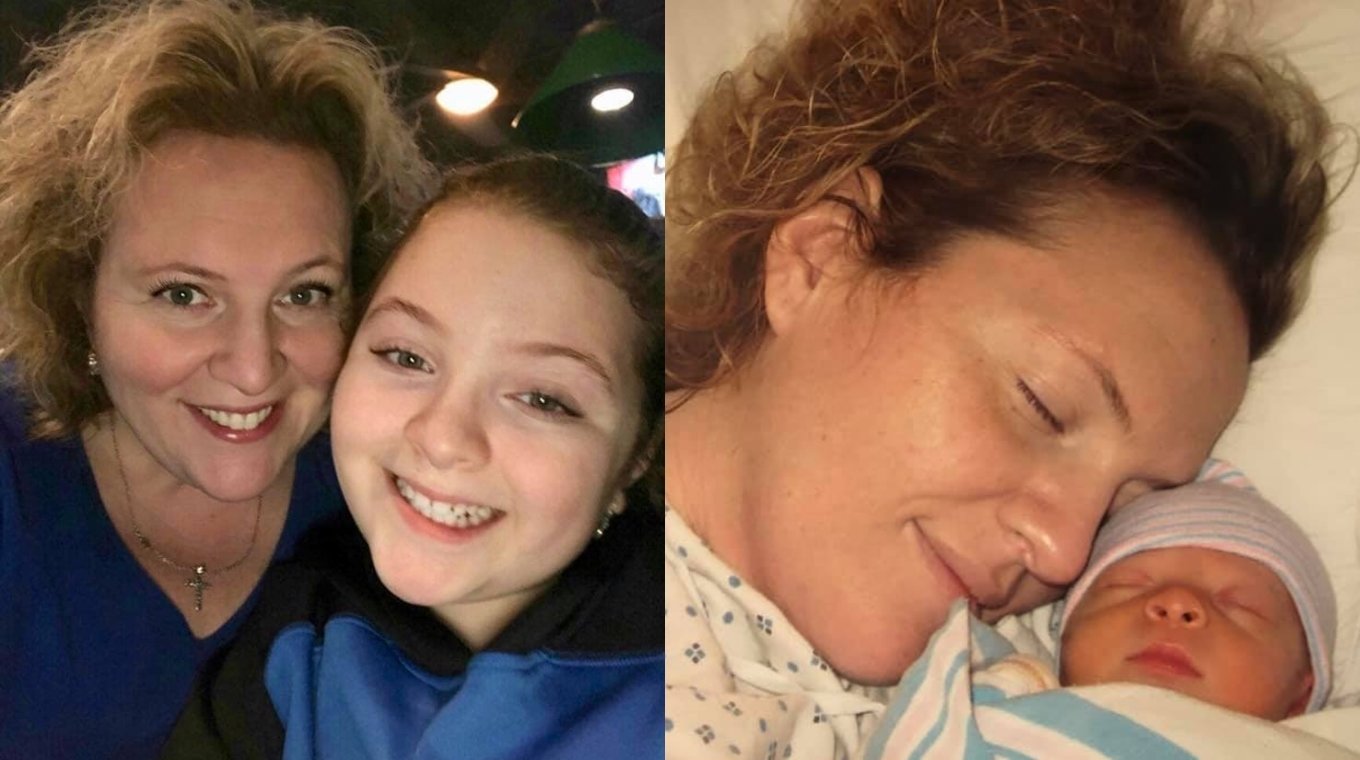
The coronavirus pandemic has upended everyone's plans for 2020, but Adrianna Keizer-D’Anna has been facing an especially difficult heartache lately. After struggling to conceive her second child for years, suffering six miscarriages and eight failed IVF transfers, Keizer-D’Anna and her husband Nicholas were about to give it one last shot. That is, until the coronavirus hit, and their pregnancy dreams once again had to be put on hold.
In a new essay as told to People, Keizer-D’Anna says that getting pregnant with her first child was no trouble at all.
In fact, just four months after her 2008 wedding, she became pregnant with her daughter Sophia, now 10. That said, it wasn't an easy nine months.
"It was a high-risk pregnancy," Keizer-D’Anna wrote. "I was constantly vomiting and lost almost 20 lbs. There was low fetal growth and I showed signs of pre-eclampsia. I was in and out of the hospital throughout the pregnancy and gave birth by C-section at 37 weeks."
The reason for her complications, doctors believed, was because of the gastric bypass she had in 2006, during which Keizer-D’Anna dropped 130 pounds.
In the end, though, it was all worth it.
The couple soon welcomed their daughter, Sophia, who was by all accounts healthy and happy, and they had no reason to believe they'd have trouble giving her a little brother or sister one day.
But just two years later, the Mount Vernon, New York, couple began a 10-year journey to conceive that has brought with it a series of devastating heartbreaks.
First came a miscarriage at six weeks, after the couple conceived naturally.
That was followed by an emotional D&C (dilation and curettage) and genetic testing, which showed the cause was chromosomal.
Another pregnancy in 2011 resulted in a difficult miscarriage too — this time at eight weeks. Together, the couple decided it was time to take a break.
Then, in the summer of 2013, came one more shot at hope: Keizer-D’Anna was once again pregnant, and the couple became hopeful this was finally it.
Sadly, it wasn't. Seven weeks later came another miscarriage, and the following year, a fourth.
"At this point, I developed blood clots in my legs and was hospitalized," the mother recalled. But it was this hospitalization that led to a surprising diagnosis.
"It was discovered that I have a blood clotting disorder called Factor V," she told People. "After further testing, I was told that the miscarriages were likely due to these blood clotting issues and that if we tried again, I’d need to be on blood thinners."
The couple didn't lose hope, and continued to try for another baby. But by now, Keizer-D'Anna was diagnosed with secondary infertility due to her age.
After three failed IUIs, they made the decision to switch to IVF. But unfortunately, that too would become a long, difficult, and painful process.
Speaking with People, Keizer-D'Anna described what she went through in painful detail:
"After nine egg retrievals, 12 transfers, four clinics, six surgeries (including having both of my tubes removed due to damage from all the retrievals), an attempt to remove my uterine septum, 60 lbs. of weight gain from the various medications and much more, I was lucky to get pregnant via IVF in October 2017."
But her joy was once again short-lived. She miscarried at six weeks, and then the following year, in 2018, at just five weeks.
"Both of these pregnancies were through transfers of my own embryos," she explained.
By now, extensive testing led doctors to believe another condition might also be playing a role in her many miscarriages.
"At that time, I tested positive for elevated NK cells, which play a vital role in immune system functioning," she shared. "Your body intentionally rejects embryos, not recognizing them as a part of you but as a 'foreign object.'"
There are treatments for this, she shared, but they aren't just expensive — they're relentless and hard on the body, which can often lead to side effects including blurred vision, panic attacks, night sweats, and more.
"It was three months of pure hell, and I did it two times," Keizer-D'Anna shared. "It was all very costly and I still miscarried. The doctor was at a loss. I had literally done every course of treatment."
Finally, the couple were advised to try donor eggs -- something that Keizer-D'Anna admits was a difficult and emotional decision.
"We only had one viable embryo from the batch of eggs we bought (and fertilized with my husband’s sperm)," she told the magazine. "We transferred that one in March 2019, along with one of my own embryos."
When both failed to implant, she says she was "devastated." Their quest to have another baby had by that point left them emotionally and financially drained. They were in almost $80,000 of debt, between loans and credit card bills. They'd even borrowed from their retirement accounts in hopes of a transfer finally working.
Despite a decade-long cycle of renewed hope and crushing disappointment, they weren't ready to throw in the towel just yet.
They decided to try IVF — one last time — and went for a final retrieval in April of 2019. From that retrieval, they extracted two viable embryos. Although Keizer-D'Anna says they are both of "OK quality," they haven't been genetically tested, and aren't likely to be.
"Many doctors believe that it can be disastrous on older eggs to test them and the results are still a crapshoot," she explained. "Plus, it costs thousands of dollars and we are literally out of money."
Finally, in March of 2020, the couple was ready to move ahead with the transfer. But then the virus intervened.
"I began my new cycle on my birthday, March 6, but was told not to start any medications just yet due to the uncertainty of the virus trajectory," Keizer-D'Anna wrote. "The following morning, I was informed by my clinic that no new cycles were to start until further notice."
She was shocked.
"Never in a million years did I think COVID-19 would impact my transfer," she told People. "Unfortunately, I had already ordered my medication, and it can't be returned: $500 for the cycle, and I have no insurance coverage for meds after this."
Keizer-D'Anna also spoke with CBS News earlier this month, and said that the delay of her last-ditch effort at IVF is a tough blow.
"I'm numb at this point," said the mother, who works as a New York City schoolteacher. "It's the norm with IVF that there's ups and downs, but you never get used to the phone call that says you can't move further, you can't move on."
Her biggest concern? That by the time fertility clinics are allowed to return to normal, her age will play an even bigger role in her ability to become — and stay — pregnant.
"I'm very nervous because what if this takes another year?" she said.
By then, she'll be 44, and if the pregnancy takes, she would give birth at 45.
Time is something a lot of IVF couples just don't have on their side.
Yet the cruel reality of the coronavirus is that they have no choice but to wait.
"I don't know what that time frame is going to look like in terms of when we can reinitiate care," Dr. Serene Srouji, medical director at The Center for Infertility and Reproductive Surgery at Brigham and Women's Hospital, told CBS.
Right now, the biggest issue doctors face is that they simply don't have enough data to inform them about how a baby conceived with a mother who tested positive for the virus could be affected. There is also little known about whether pregnancy makes the body more vulnerable to COVID-19, as it is with the flu.
"Infertility in general is hard and feeling out of control is hard," Srouji told CBS. "It doesn't make it any easier as we're delaying things."
But for now, that's all Keizer-D'Anna and her husband can do. Wait and hope that things will be safe again soon — and when the wait is finally over, they will finally get their rainbow baby.




